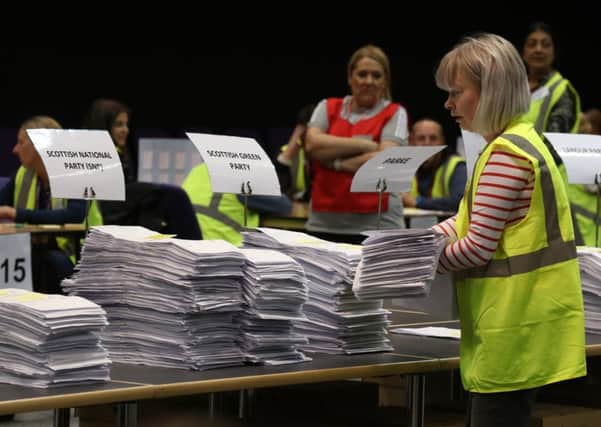Willie Sullivan: How to overhaul crumbling Westminster system


Amid political turmoil, it often feels as if our constitution was won in a lucky bag. Westminster continues to fall apart and yet remains stubbornly unreformed, with a totally unelected House of Lords and widespread voter alienation. The devolution process has left voters on the sidelines.
Despite these problems, clear for all to see, next to nothing has been done to deal with the root of the problem.
Advertisement
Hide AdAdvertisement
Hide AdWe can already see the results of failing to reform our broken democracy – new polling for a report by the Electoral Reform Society – Westminster Beyond Brexit – shows just how little power Scottish voters feel they have over politics.
Two-thirds (67 per cent) of people feel like they have no or very few opportunities to inform and influence decisions made by their elected representatives. Almost half (47 per cent) of people do not feel at all or very represented by parties at Westminster. And while 64 per cent of people think that our political system should encourage co-operation between political parties, with Scots more likely to agree, yet only 19 per cent believe that it currently does so.
If politicians fail to act and restore faith in politics, these numbers are only going to get worse.
There are long-standing democratic deficits in our political system that have been ignored. In 1976, Lord Hailsham warned that the UK resembles an “elective dictatorship”. In the absence of efforts to offer better democracy, that remains all too true.
The Brexit deadlock has shown just how broken the centralised Westminster system really is – with parties refusing to work together until the last moment, and voters left on the sidelines and the views of Scotland all but ignored in the Brexit process. Now more than ever we can see the need for a total overhaul of Britain’s centralised Westminster model.
We’ve just set out a roadmap to fix the crumbling Westminster system – including moving to a democratically elected second chamber, and increasing the use of deliberative democracy to involve citizens in the decisions that affect their lives, both locally and on the big constitutional issues.
We need to address the hyper-centralising tendencies of the Westminster system, moving to a model of power sharing not hoarding. We also need to move politics from the dusty corridors of parliament and into our communities.
It’s time for a fundamental shift in how politics works, with citizens involved in our democracy at every level – not just every four or five years. ERS Scotland have been trying to do just this across Scottish local government through our Act As If We Own The Place work, but now we need a national approach. As the report notes: “People can and should be given the power to shape the future of politics in a more active and consistent way.”
Advertisement
Hide AdAdvertisement
Hide AdWe could start by replacing the unelected House of Lords with a fairly elected chamber dedicated to representing the nations and communities of the UK – calling time on the London-dominated and unelected Lords. A reformed upper house would deal with issues relating to inter-governmental relations and represent the constituent parts of the UK.
We welcome the Scottish Government’s recent calls for a citizens’ assembly on independence, but that should not be a one-off: citizens’ assemblies should be used throughout our political process to deal with complex and contested issues.
There must be a UK-wide Constitutional Convention – with citizen involvement – which would put the UK’s crumbling structures under the spotlight and draw up plans for reforming Westminster giving people from all our regions and nations a chance to influence our country’s democratic future and shape relations between the different parts of the UK.
Now is the time to grasp the nettle, to rebuild our democracy on stronger and fairer foundations. Politicians must rise to this challenge and commit to the reforms required to build the democracy we so desperately need.
Willie Sullivan is senior director for campaigns at the Electoral Reform Society. Its new report, Westminster Beyond Brexit: Ending the Politics Of Division, is available at https://bit.ly/2YSpq5A